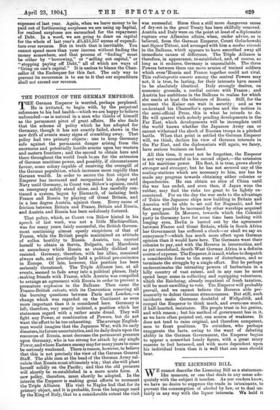That policy, which, as Count von Billow hinted in his
speech of last week, was not a little Machiavellian, was for many years fairly successful, the British Govern- ment continuing almost openly suspicious of that of France, while the British people maintained an attitude of sullen hostility to Russia. Austria, too, exerted
i
herself to obtain in Servia, Bulgaria, and Macedonia an ascendency which Russia as steadily disliked and resisted. Germany, therefore, with her allies, remained always safe, and practically held a political pre-eminence in Europe. Of late, however, this position has been seriously threatened. The Triple Alliance has, at all events, seemed to fade away into a political phrase, Italy .making friends with France, while Austria was compelled to arrange an agreement with Russia in order to prevent a premature explosion in the Balkans. Then came the Franco-British entente, with its Convention removing all the burning questions between Paris and London,—a change which was regarded on the Continent as even more important than it is considered here. Germany is left, therefore, very nearly isolated, a position which her statesmen regard with a rather acute dread. They will fight any Power, or combination of Powers, but do not want the effort to be too exhausting. The average English. man would imagine that the Japanese War, with its early disasters, its future uncertainties, and its daily drain upon the resources of Russia, must decrease the permanent pressure upon Germany, who is too strong for attack by any single Power, and whose Eastern enemy may for many years to come be seriously weakened. There is reason, however, to believe that this is not precisely the view of the German General Staff. The able men at the head of the German Army cal- culate that Russia must ultimately win ; that she will plant herself solidly on the Pacific ; and that the old pressure will shortly be re-established in a more acute form. A new policy, therefore, must shortly be adopted. In the interim the Emperor is making great efforts to recement the Triple Alliance. His visit to Naples had that for its primary object, and it is probable, from the language used by the King of Italy, that to a considerable extent the visit
THE LICENSING BILL.
li'ISTE cannot describe the Licensing Bill as a statesman- like measure, or one that deals in any sense ade- quately with the subject it touches. As our readers know, we have no desire to suppress the trade in intoxicants, to prevent the consumption of alcohol by law, or to deal un- fairly in any way with the liquor interests. We hold it










































 Previous page
Previous page